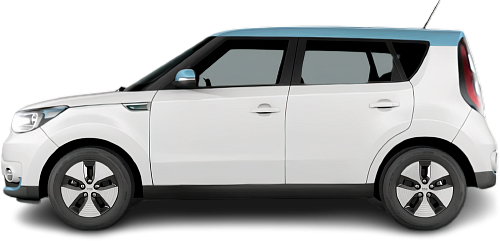Global EV Comparison: Kia Soul EV Gen 1 vs Tesla Model 3 Standard Range
Struggling to Decide? Let AI Help!
Your AI Summary Is Ready!
General Info
Since both vehicles have been discontinued, they are now only available on the used car market. You can get the Kia Soul EV (2014-2017) for as low as €8799, while the Tesla Model 3 Standard Range (2019-2020) begins at €18790.
The Kia Soul EV (2014-2017) is a SUV, whereas the Tesla Model 3 Standard Range (2019-2020) is a Sedan.
| Property | Kia Soul EV Gen 1 | Tesla Model 3 Standard Range |
|---|---|---|
| Years of Production | 2014-2017 | 2019-2020 |
| Current Status | Discontinued | Discontinued |
| Country of Manufacture | South Korea | China, Germany, USA |
| Body Style | SUV | Sedan |
| Market Availability | EU, USA | EU, USA |
| Price Europe (Used) | €8799 | €18790 |
| GCC Score | 4.5 | 6.1 |
Range and Efficiency
The Tesla Model 3 Standard Range (2019-2020) boasts a greater real-world range, a larger battery, and superior energy efficiency compared to the Kia Soul EV (2014-2017).
| Property | Kia Soul EV Gen 1 | Tesla Model 3 Standard Range |
|---|---|---|
| Range (EPA) | 150 km | 354 km |
| Range (GCC) | 151 km | 336 km |
| Battery Capacity (Nominal) | 30.5 kWh | 60 kWh |
| Battery Capacity (Usable) | 27 kWh | 57.5 kWh |
| Efficiency per 100 km | 17.9 kWh/100 km | 17.1 kWh/100 km |
| Efficiency per kWh | 5.59 km/kWh | 5.84 km/kWh |
| Range and Efficiency Score | 4.6 | 6.2 |
Charging
Both vehicles utilize a standard 400-volt architecture.
The Tesla Model 3 Standard Range (2019-2020) offers faster charging speeds at DC stations, reaching up to 170 kW, while the Kia Soul EV (2014-2017) maxes out at 50 kW.
The Tesla Model 3 Standard Range (2019-2020) features a more powerful on-board charger, supporting a maximum AC charging power of 11 kW, whereas the Kia Soul EV (2014-2017) is limited to 3.6 kW.
| Property | Kia Soul EV Gen 1 | Tesla Model 3 Standard Range |
|---|---|---|
| Max Charging Power (AC) | 3.6 kW | 11 kW |
| Max Charging Power (DC) | 50 kW | 170 kW |
| Architecture | 400 V | 400 V |
| Charge Port | CHAdeMO | CCS Type 2 (Tesla) |
| Charging Score | 3.2 | 5.6 |
Performance
The Tesla Model 3 Standard Range (2019-2020) is rear-wheel drive, while the Kia Soul EV (2014-2017) offers a front-wheel drive system.
The Tesla Model 3 Standard Range (2019-2020) boasts greater motor power and accelerates faster from 0 to 100 km/h.
| Property | Kia Soul EV Gen 1 | Tesla Model 3 Standard Range |
|---|---|---|
| Drive Type | FWD | RWD |
| Motor Type | PMSM | PMSM |
| Motor Power (kW) | 81 kW | 208 kW |
| Motor Power (hp) | 109 hp | 279 hp |
| Motor Torque | 285 Nm | 420 Nm |
| 0-100 km/h | 11.2 s | 6.1 s |
| Top Speed | 145 km/h | 225 km/h |
| Performance Score | 2.4 | 5 |
Dimensions
The Tesla Model 3 Standard Range (2019-2020) is longer and wider, but the Kia Soul EV (2014-2017) is taller.
The Tesla Model 3 Standard Range (2019-2020) boasts a more extended wheelbase.
| Property | Kia Soul EV Gen 1 | Tesla Model 3 Standard Range |
|---|---|---|
| Length | 4140 mm | 4695 mm |
| Width (with Mirrors) | - Width (with Mirrors) | 2088 mm |
| Width (w/o Mirrors) | 1800 mm | 1850 mm |
| Height | 1593 mm | 1445 mm |
| Wheelbase | 2570 mm | 2875 mm |
Cargo and Towing
The Tesla Model 3 Standard Range (2019-2020) provides more cargo capacity, featuring both a larger trunk and more space with the rear seats folded.
A frunk (front trunk) is available in the Tesla Model 3 Standard Range (2019-2020), but the Kia Soul EV (2014-2017) doesn’t have one.
The Tesla Model 3 Standard Range (2019-2020) has a towing capacity of up to 1000 kg, whereas the Kia Soul EV (2014-2017) is not officially rated for towing in the EU.
| Property | Kia Soul EV Gen 1 | Tesla Model 3 Standard Range |
|---|---|---|
| Number of Seats | 5 | 5 |
| Curb Weight | 1492 kg | 1611 kg |
| Cargo Volume (Trunk) | 281 l | 561 l |
| Cargo Volume (Max) | 891 l | 1235 l |
| Cargo Volume (Frunk) | - Cargo Volume (Frunk) | 88 l |
| Towing Capacity | - Towing Capacity | 1000 kg |
| Cargo and Towing Score | 5.4 | 5.1 |




